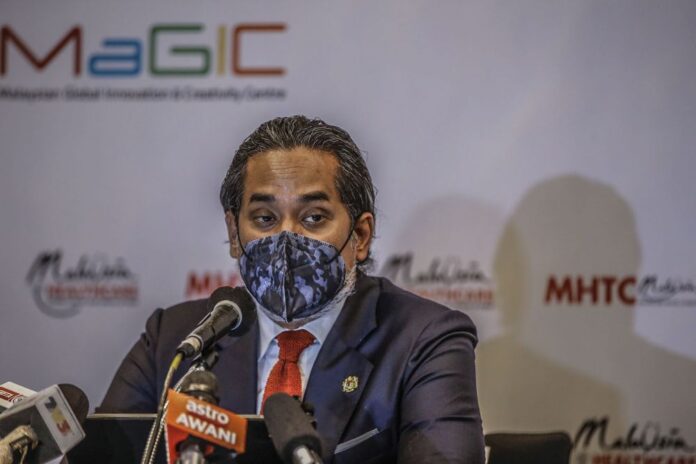Health Minister Khairy Jamaluddin, during a press conference today, explained how the incubation period, typical symptoms and infectivity of the B.1.1.529 variant are still being studied. — Picture by Hari Anggara
KUALA LUMPUR, Nov 26 — The Ministry of Health (MoH) today announced it is monitoring the B.1.1.529 Covid-19 variant, a new mutation of the coronavirus with 32, or double the amount of spike proteins within the currently dominant Delta variant.
Health Minister Khairy Jamaluddin, during a press conference today, explained how the incubation period, typical symptoms and infectivity of the B.1.1.529 variant are still being studied.
Khairy said to date, cases of infection involving the new variant have been detected in three countries, with 77 cases in South Africa, four cases in Botswana, and two cases in Hong Kong.
“Based on genomic surveillance carried out until November 26, there are no cases of the virus’ new B.1.1.529 variant reported yet in Malaysia.
“As of now, the World Health Organisation (WHO) is still assessing developments related to the new B.1.1.529 variant. For now, this new variant has been categorised by the WHO as a Variant Under Monitoring (VUM),” he said during his press conference today.
Following the discovery of the new variant, Khairy said MoH has decided to implement several precautionary measures, with Malaysians no longer allowed to travel to South Africa, Botswana, Eswatini, Lesotho, Mozambique, Namibia, and Zimbabwe.
Foreigners with a travel history from these seven countries within the last 14 days will be denied entry to Malaysia.
Khairy said as for Malaysians or permanent residents looking to return from these countries, regardless of their vaccination status, they will have to undergo mandatory 14-day quarantine at a designated isolation centre and will not be allowed to quarantine at home.
“Besides that, samples will be taken from these individuals who arrive from these countries as part of the genomic surveillance.
“This decision will come into effect on November 27, 2021,” he said.
The first cases of the B.1.1.529 variant, according to MoH, were reported in Botswana on November 11, then three days later in South Africa, followed by another case reported yesterday in Hong Kong with the patient having previously travelled to South Africa.


